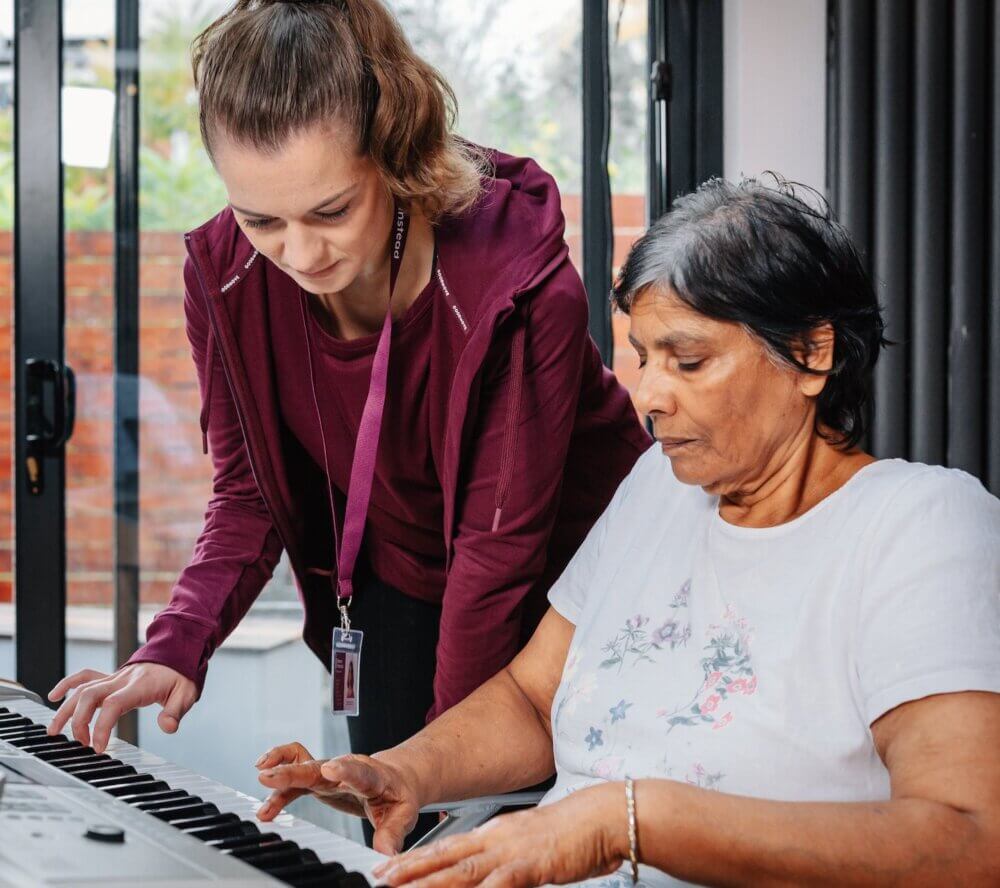Starting Meaningful Conversations: Topics and Questions to Encourage Deep Conversation in Warminster
At Home Instead Warminster & Gillingham, we believe that meaningful conversations are the cornerstone of strong relationships, especially when it comes to caregiving.

At Home Instead Warminster & Gillingham, we believe that meaningful conversations are the cornerstone of strong relationships, especially when it comes to caregiving. Whether you are a family member, friend, or caregiver, engaging in deep and meaningful conversations can enhance understanding, provide emotional support, and strengthen bonds. This blog post explores various topics and questions designed to encourage such conversations, helping you connect more deeply with your loved ones in Warminster.

The Importance of Meaningful Conversations
Meaningful conversations are more than just small talk; they are dialogues that foster deeper connections and mutual understanding. These conversations can help caregivers better understand the needs, preferences, and experiences of those they care for, ensuring a higher quality of personalised care. For families, these dialogues can bridge generational gaps, preserve memories, and provide emotional support during challenging times.

Topics and Questions to Encourage Deep Conversations
1. Personal Histories and Memories
Understanding someone’s past is key to appreciating who they are today. Engaging in conversations about personal histories can bring joy, evoke fond memories, and provide insights into a person’s values and life experiences.
Questions to Ask:
- What is your favourite childhood memory?
- Can you describe a significant event that shaped your life?
- What traditions did your family have when you were growing up?
2. Life Lessons and Advice
Elders often have a wealth of knowledge and life experience that can be invaluable. Asking for their advice or the lessons they’ve learned can not only provide wisdom but also make them feel valued and respected.
Questions to Ask:
- What is the best piece of advice you’ve ever received?
- What life lesson do you think is most important to pass on to younger generations?
- How did you handle difficult times in your life?
3. Hobbies and Interests
Discussing hobbies and interests can uncover passions that you might not have known about. These conversations can lead to shared activities and hobbies, further strengthening bonds.
Questions to Ask:
- What hobbies have you enjoyed throughout your life?
- Are there any new activities you’d like to try?
- What book, movie, or music has had a big impact on you?
4. Dreams and Aspirations
No matter the age, everyone has dreams and aspirations. Talking about these can be inspiring and motivational, and it shows that you care about their hopes and desires.
Questions to Ask:
- What are some of your dreams that you have yet to achieve?
- Is there a place you’ve always wanted to visit?
- What would you do if you could pursue any passion without limitations?
5. Family and Relationships
Family dynamics and relationships are often central to a person’s life. These conversations can strengthen family bonds and provide a deeper understanding of family history and relationships.
Questions to Ask:
- How did you meet your spouse or best friend?
- What are some of your favourite family traditions?
- Can you share a memorable family story?

Techniques for Encouraging Deep Conversations
Active Listening
Active listening involves fully concentrating, understanding, responding, and remembering what is being said. It shows that you value the speaker’s thoughts and feelings, encouraging them to share more openly.
Tips:
- Maintain eye contact and nod to show you are engaged.
- Avoid interrupting while the other person is speaking.
- Reflect back what you’ve heard to show understanding and prompt further discussion.
Creating a Comfortable Environment
The environment in which conversations take place can significantly impact their depth and quality. Ensure that the setting is quiet, comfortable, and free of distractions.
Tips:
- Choose a quiet place where you won’t be interrupted.
- Ensure physical comfort with suitable seating and lighting.
- Be patient and give the conversation the time it needs to unfold naturally.
Being Patient and Open-Minded
Meaningful conversations often require time and patience. Being open-minded and non-judgmental encourages others to share more deeply.
Tips:
- Allow pauses and silences; don’t rush to fill them.
- Show empathy and understanding, even if you don’t fully agree with what’s being said.
- Be genuinely curious and open to learning about the other person’s perspective.

Benefits of Meaningful Conversations in Caregiving
Improved Emotional Well-being
Meaningful conversations can significantly enhance the emotional well-being of those receiving care. Feeling heard and understood can reduce feelings of loneliness and isolation, which are common among the elderly.
Enhanced Trust and Rapport
Regular deep conversations can build trust and rapport between caregivers and clients. This trust is crucial for effective caregiving, as it makes clients more likely to communicate their needs and concerns openly.
Personalised Care
Understanding the personal histories, preferences, and values of clients allows caregivers to provide more personalised and respectful care. This can lead to better outcomes and higher satisfaction with the care received.

Services Offered by Home Instead Warminster & Gillingham
At Home Instead Warminster & Gillingham, we offer a range of services designed to support meaningful conversations and provide exceptional care:
- Personal Care: Assisting with daily activities while respecting the individual’s preferences and routines.
- Companionship Care: Engaging clients in activities and conversations that they enjoy, reducing feelings of loneliness.
- Specialist Dementia Care: Providing tailored support for those living with dementia, ensuring they feel understood and valued.
- Home Help Services: Assisting with household tasks to allow clients to focus on enjoying their time and maintaining independence.

Effective Conversation Starters and Techniques
Small Talk as a Gateway to Deeper Conversations
Small talk often serves as the foundation for more meaningful conversation. Using effective conversation starters can ease awkward silences and lead to deeper discussions.
Tips:
- Start with light topics before gradually introducing more personal or deep conversation topics.
- Use open-ended questions to encourage the other person to share more about themselves.
Example Questions:
- What did you do today that made you happy?
- Have you read any interesting books recently?
Engaging as a Good Conversation Partner
Being a good conversation partner involves actively listening and showing genuine interest in the other person’s thoughts and feelings. This creates a sense of connection and encourages further sharing.
Tips:
- Ask follow-up questions to show you are actively listening and engaged.
- Express gratitude for their openness and willingness to share.
Example Questions:
- Can you tell me more about that experience?
- How did that make you feel?
Building Confidence in Conversation Skills
Building confidence in your conversation skills can help facilitate more meaningful and intimate conversations. Practice and preparation can make a significant difference.
Tips:
- Prepare some conversation starters and follow-up questions ahead of time.
- Practise active listening and reflect on previous conversations to improve.

Creating Moments of Connection and Understanding
Sharing Three Wishes
Asking someone about their three wishes can be a fun and revealing way to understand their hopes and dreams.
Questions to Ask:
- If you had three wishes, what would they be and why?
- How do you think these wishes reflect your values and desires?
Finding Common Ground
Identifying shared interests or experiences can create a strong bond and make conversations more engaging.
Questions to Ask:
- What hobbies or activities do we both enjoy?
- Have we ever shared a similar experience or event?
Addressing Controversial Topics with Care
While it is often best to avoid controversial topics, there are times when discussing them can lead to greater understanding and respect.
Tips:
- Approach such topics with an open mind and respect for differing opinions.
- Focus on listening and understanding rather than debating or convincing.

Introducing Age UK Wiltshire's Telephone Befriending Service
In addition to the services provided by Home Instead Warminster & Gillingham, we are delighted to highlight another invaluable resource available to the elderly in our community: Age UK Wiltshire’s Telephone Befriending service.
A Friendly Chat When You Need It
Age UK Wiltshire offers a complimentary weekly telephone call service, connecting older individuals who may be spending extended periods alone at home or those with caregiving responsibilities that limit their social interactions, with a friendly volunteer. This initiative aims to alleviate feelings of loneliness and isolation by providing regular, meaningful conversation.
How Does Telephone Befriending Work?
For those over 65 experiencing loneliness, Age UK Wiltshire matches them with a dedicated volunteer who engages them in weekly chats. These calls often become a cherished part of the week for many, fostering new friendships and providing a significant boost to emotional well-being. To enrol, individuals simply need to provide some basic information, and the service will take care of the rest.
Eligibility and Alternative Services
To qualify for the regular telephone befriending service, participants must be over 65, experiencing loneliness or isolation, spending most of their time alone or as carers, and have access to a landline or mobile phone. They must also be able to receive calls at prearranged times.
For those not eligible for this specific service or seeking alternative options, Age UK Wiltshire provides information on other befriending services, such as Age UK’s Call in Time (nationwide), Alabare’s mental health and wellbeing support, and Re-Engage Call Companions, among others.
Supporting Age UK Wiltshire
Age UK Wiltshire is dedicated to enhancing the lives of older people in need through a range of support services. Donations are crucial for maintaining and expanding these services, ensuring that more individuals can benefit from regular companionship and support.
For more information about Age UK Wiltshire’s Telephone Befriending service or to explore other available services, please visit their website. Let’s work together to build a supportive community where every conversation brings comfort and joy.

Conclusion
Starting meaningful conversations is a powerful way to connect with those you care for, whether as a family member or a professional caregiver. By exploring personal histories, life lessons, hobbies, dreams, and family relationships, you can build deeper connections and provide better, more empathetic care. At Home Instead Warminster & Gillingham, we are dedicated to fostering these connections and supporting our clients in leading fulfilling lives.
For more information on our services or to start a conversation with our team, please contact us today. Let’s build a community where every conversation is a step towards understanding and compassion.

Areas We Serve
Warminster, Trowbridge, Shaftsbury, Gillingham & surrounding areas
BA12 0, BA12 6, BA12 7, BA12 8, BA12 9, BA13 2, BA13 3, BA13 4, BA14 0, BA14 6, BA14 7, BA14 8, BA14 9, BA8 0, BA9 9, DT10 1, DT10 2, SP3 5, SP3 6, SP7 0, SP7 8, SP7 9, SP8 4, SP8 5
The Design Centre, Crusader Park, Roman Way, Warminster BA12 8SP